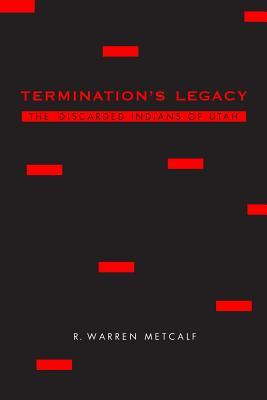The mixed-blood Utes fell outside the formal categories of classification by the federal government, they did not meet the essentialist expectations of some officials of the Mormon Church, and their regaining of tribal status potentially would have threatened those Utes already classified as tribal members on the reservation. Skillfully weaving together interviews and extensive archival research, R. Warren Metcalf traces the steps that led to the termination of the mixed-blood Utes' tribal status and shows how and why this particular group of Native Americans was never formally recognized as "Indian" again. Their repeated failure to regain their tribal status throws into relief the volatile key issue of identity then and today for full- and mixed-blood Native Americans, the federal government, and the powerful Mormon Church in Utah.

Termination's Legacy: The Discarded Indians of Utah
The mixed-blood Utes fell outside the formal categories of classification by the federal government, they did not meet the essentialist expectations of some officials of the Mormon Church, and their regaining of tribal status potentially would have threatened those Utes already classified as tribal members on the reservation. Skillfully weaving together interviews and extensive archival research, R. Warren Metcalf traces the steps that led to the termination of the mixed-blood Utes' tribal status and shows how and why this particular group of Native Americans was never formally recognized as "Indian" again. Their repeated failure to regain their tribal status throws into relief the volatile key issue of identity then and today for full- and mixed-blood Native Americans, the federal government, and the powerful Mormon Church in Utah.